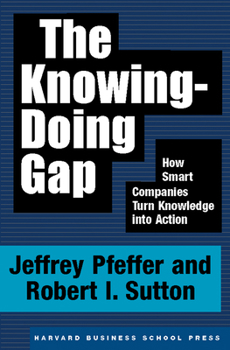The Knowing-Doing Gap: How Smart Companies Turn Knowledge Into Action
Select Format
Select Condition 
Book Overview
Why are there so many gaps between what firms know they should do and what they actually do? Why do so many companies fail to implement the experience and insight they've worked so hard to acquire? The Knowing-Doing Gap is the first book to confront the challenge of turning knowledge about how to improve performance into actions that produce measurable results. Jeffrey Pfeffer and Robert Sutton, well-known authors and teachers, identify the causes...
Format:Hardcover
Language:English
ISBN:1578511240
ISBN13:9781578511242
Release Date:January 2000
Publisher:Harvard Business Review Press
Length:336 Pages
Weight:0.45 lbs.
Dimensions:1.2" x 6.4" x 9.4"
Customer Reviews
5 ratings
The virtues of clear thinking
Published by Thriftbooks.com User , 24 years ago
It seems like a straightforward question: Why aren't we doing what we know we should be doing? The answer to this question, it would seem, should be both simple and complex; this book's main virtue is that it provides both. Their unblinking examinations of so many obvious and ridiculous screw-ups and mess-ups of all kinds makes the simple foolishness of it all so completely apparent (this collection of examples alone is well worth the cost of admission). But then again (thankfully), they don't oversimplify their discussion of the full range of the "human and organizational frailties" that we've all learned to know and love, and that are at the source of these kinds of problems. If you want a hand-holding spoon-feeding checklist, look elsewhere. The authors show specifically why this kind of "checklist" attitude is a BIG part of the problem (notice how the summaries they provide at the end of each section pull together their main points nicely without oversimplifying them). However if you're looking for a guide to help you to actually think your way through these kinds of problems, as they beset you in your organizational life (and possibly in your personal life), then this is a definite "must read."For these reasons (and both because of and in spite of its critique of MBA education practices), this book will become definite required reading in our core management course.
An excellent guide for linking strategy to action
Published by Thriftbooks.com User , 24 years ago
As a consultant working with various companies, I found the content of this book very useful in providing a framework for strategic planning sessions. One of the biggest challenges for executive leadership teams is to move from smart talk to action. Using the principles from this book, I've found leadership teams now focused not only on strategic thinking but also on translating that thinking into action. In addition, the Harvard Business Review article, "The Smart Talk Trap", was excellent pre-reading for executives prior to the strategic planning session. The case studies provided real life examples that leaders can relate to. This book is a must read for anyone struggling to implement new strategies! I intend to continue to use it with executive leadership teams.
A very good addition for a well-balanced management library
Published by Thriftbooks.com User , 24 years ago
I found this work to contribute a much-needed balance to the vast number of books that only deal with strategy recommendations; this text in contrast provides ample case studies and a framework for considering how to wrestle with the hard work of strategy execution. The balance of chapters is unusual for a management text -- 5 full chapters highlighting various classes of problems that occur in organizations -- but I think this is appropriate. I found myself seeing many instances of the same traps the authors cite in my own organization and now have a new approach to seek solutions. Again, a good addition for a well-balanced management library.
A well-written book that's right on the money
Published by Thriftbooks.com User , 24 years ago
I purchased this book after reading the authors' Harvard Business Review article on the "smart talk trap." I found myself nodding in agreement with the points they made in that article, and their book has proven to be equally insightful. In a clear, concise manner, Pfeffer and Sutton describe (and illustrate) some of the key organizational impediments to action and implementation, and perhaps more importantly, highlight ways to circumvent them. I highly recommend this book, especially to anyone in industry who feels analysis should be a means, not an end. And if you've grown weary of reading about the latest management fads and buzzwords, this book is a refreshing departure.
Why can't companies do what they know is right?
Published by Thriftbooks.com User , 24 years ago
Pfeffer and Sutton provide two important lessons for managers: 1) they define the major impediments to implementing performance-enhancing innovations, and 2) they describe dozens of real-life examples of companies that either fell prey to these impediments or conquered them. The great thing about this book is that it uncovers some common mistakes that we all make, but are afraid to correct. Things like confusing "smart talk" for smart actions and relying on fear as a motivator are easily recognized as dumb managerial thinking. Yet, we've all sat in meetings and conceeded to the speaker with the big words and the intimidating manner - even if we know he or she is wrong - because we're afraid to acknowledge that we know better and because we assume that anyone with this vocabulary must be working as well as he or she is speaking. I've already used this book as an illustration of wrong management practices in my research, and intend to use it in my MBA courses.




